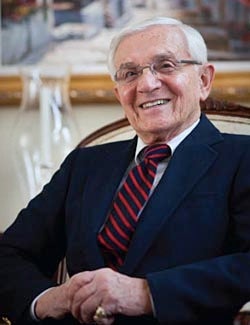Development News: Lighting Up the Stage
Richard Wolcott's Philanthropy Provides Opportunities for a New Generation of Actors
Richard H. Wolcott is not sure how to explain his love for the theater. But he enjoys telling the story of how it began.
Not long after he graduated from Western Reserve University in 1950, a friend invited Wolcott along on a trip to New York City. At the original Ziegfeld Theater at Sixth Avenue and W. 54th Street, the two young men from Cleveland saw Gentlemen Prefer Blondes, with songs by Jule Styne, dances by Agnes de Mille and a star turn by Carol Channing. It was Wolcott's first Broadway show. He still remembers marveling at the costumes, which even Brooks Atkinson, drama critic for The New York Times, had called "stunning." And he can recite his favorite lyrics accompanied by melodies that are still running through his head.
That experience made Wolcott a theatergoer. Soon he was visiting New York six or seven times a year; he'd think nothing of catching a matinee and an evening performance on a single day. And long afterward, when the opportunity presented itself, Wolcott became a supporter of theater education. Since the mid-1990s, he has dedicated his annual gifts to the college's theater program, and he recently made a significant will commitment to guarantee its future. Maybe, he says, "I can help in the development of the next Ethel Merman."
Lessons Well Learned
Dick Wolcott was born in East Cleveland in 1925. "All of my school years took place during the Depression," he recalls. "We always had food, shelter and clothing. But money was tight and luxuries nonexistent." Movies were the only entertainment his parents could afford. Wolcott concedes that the Hollywood films of that era were on the frivolous side: "It was escapism, I guess. But there was so much sadness in the real world."
Wolcott finds that his memories of the Depression have shaped his response to the current economic downturn. "It doesn’t startle me the way it startles people who have only lived through good times," he explains. "My earliest days and experiences taught me the value of a dollar, the importance of a good job and the necessity of saving for that inevitable rainy day. These were lessons well learned that have paid off handsomely and permit me to give back to my community and alma mater."
In January 1944, Wolcott graduated from Shaw High School and went straight into the U.S. Navy. For the next 30 months, he "chased the Imperial Navy of Japan around the South Pacific or patrolled the chain of 6,000 Philippine Islands." Upon his return, he enrolled at Western Reserve University's Cleveland College. "Had it not been for the GI Bill," he says, "I would never have been able to go to Western Reserve."
While earning a bachelor's degree in business administration, Wolcott served as the drum major of the Red Cats' marching band and joined Delta Kappa Epsilon. Still, he "missed out on a lot of things" that most undergraduates took for granted. Cleveland College held classes for adult and part-time students downtown, so Wolcott didn't spend much time on campus. He never saw a play at Eldred Hall, and didn't find out until four decades later that the university even had a theater department.
As soon as he finished college, Wolcott went to work for the Kellogg Company, which he represented throughout the Midwest for the next 40 years. As with his other achievements, Wolcott says that he owes his business success to being in the right place at the right time. He was one of the last people hired by the company's founder, W. K. Kellogg, which meant that he had a job for life. Wolcott never accepted a promotion that would have required him to relocate from East Cleveland, but on his vacations, he traveled to "faraway places with strange-sounding names in all corners of this beautiful world."
Since retiring in 1990, Wolcott has conducted genealogical research at the Western Reserve Historical Society and given walking tours as a volunteer at Lake View Cemetery. Five years ago, he moved to Bratenahl. And now, at age 83, he is thinking about spending next winter on a cruise ship circumnavigating South America. "I still have a few things I want to do," he says.
A Nuturing Spirit
Wolcott had been a regular donor to the university well before the College of Arts and Sciences was formed in 1992. John Bassett, the college's founding dean, suggested that he begin designating his annual gifts to a program of his choice. That was when Wolcott discovered the theater program.
"Dick's unwavering generosity has been a major boon to our undergraduate and graduate theater students," says department chair Ron Wilson. "Because of his nurturing spirit, they have been able to attend national and international workshops and work with talented visiting artists. Without Dick's assistance, our students would have been denied wondrous opportunities."
Wolcott has never sought public recognition for his philanthropy. Until recently, in fact, he didn't know how much his annual gifts had amounted to. But he welcomes the possibility that an article like this one will inspire other alumni to follow his example. Then, too, he says, "I hope there’s somebody out there I haven't heard from in 50 years."

Richard H. Wolcott
Photo: David Anhtholz
